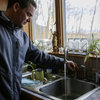Gov puts state ‘on pause’
On Friday, Governor Andrew Cuomo executed a 10-point policy meant to assure safety for everyone. There are now 7,102 confirmed cases of coronavirus in 23 counties.
Effective on Sunday at 8 p.m., all non-essential businesses are to close across the state. Also, all non-essential gatherings of any size for any reason are banned.
“Matilda’s Law,” named for the governor’s mother, is to provide new protections for the most vulnerable New Yorkers — those 70 and older, those with compromised immune systems, and those with underlying illnesses.
Matilda’s Law requires vulnerable New Yorkers to stay home and limit home visits to immediate family members or close friends in need of emergency assistance. If it is necessary to visit such individuals, the visitor should check his temperature first and not visit if he has a fever or cough. Both individuals should wear a mask for the duration of the visit.
Cuomo also directed a 90-day moratorium on residential and commercial evictions.
And he asked those with personal protective equipment — like gloves, masks, and gowns — to sell non-essential products to the state. Businesses interested in selling products to the state should contact Simonida Subotic at 646-522-8477 or covid19supplies@exec.ny.gov.
Cuomo is also encouraging any company with the proper equipment or personnel to begin to manufacture personal protective equipment if possible. The state is willing to provide funding to any company to obtain the proper equipment and personnel. Businesses interested in receiving state funding for this should contact Eric Gertler at 212-803-3100 or COVID19supplies@esd.ny.gov.
The governor listed 12 essential businesses that are exempt from the directive. These are businesses that provide essential health-care operations; essential infrastructure like public water; essential manufacturing like medical equipment; essential retail like gas stations, pharmacies, and grocery stores; and essential services like mail delivery and trash pickup.
Also: news media; financial institutions like banks; providers of basic necessities to economically disadvantaged people like food banks; construction for essential infrastructure or emergency repairs; defense; services needed to maintain safety and sanitation; and vendors that provide essential services or products, including logistics and technology support, child care and services.
The state has provided a form online for businesses to request designation as essential.
Ten points
This is the 10-point “pause plan”:
— 1. Effective at 8 p.m. on Sunday, March 22, all non-essential businesses statewide will be closed;
— 2. Non-essential gatherings of individuals of any size for any reason (such as parties, celebrations or other social events) are canceled or postponed at this time;
— 3. Any concentration of individuals outside their home must be limited to workers providing essential services and social distancing should be practiced;
— 4. When in public, individuals must practice social distancing of at least six feet from others;
— 5. Businesses and entities that provide other essential services must implement rules that help facilitate social distancing of at least six feet;
— 6. Individuals should limit outdoor recreational activities to non-contact and avoid activities where they come in close contact with other people;
— 7. Individuals should limit use of public transportation to when absolutely necessary and should limit potential exposure by spacing out at least six feet from other riders;
— 8. Sick individuals should not leave their homes unless to receive medical care and only after a telehealth visit to determine if leaving the home is in the best interest of their health;
— 9. Young people should also practice social distancing and avoid contact with vulnerable populations; and
— 10. Use precautionary sanitizer practices such as using isopropyl alcohol wipes.
Matilda’s Law
Matilda’s Law includes the following rules for vulnerable populations:
— Remain indoors;
— Can go outside for solitary exercise;
— Pre-screen all visitors and aides by taking their temperature and seeing if person is exhibiting other flu-like symptoms;
— Do not visit households with multiple people;
— Wear a mask when in the company of others;
— To the greatest extent possible, everyone in the presence of vulnerable people should wear a mask;
— Always stay at least six feet away from individuals; and
— Do not take public transportation unless urgent and absolutely necessary.



